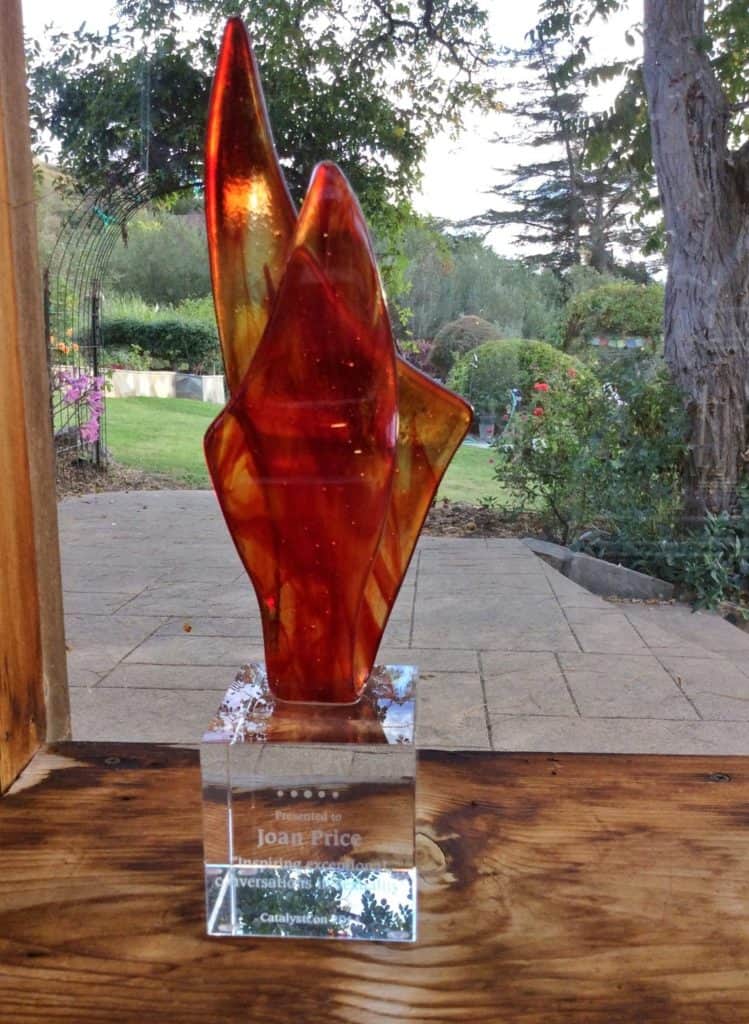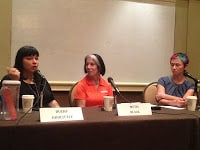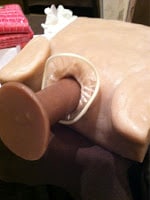Posts Tagged ‘CatalystCon’
CatalystCon West 2014: Catalyst Award!
CatalystCon – Sparking Communication in sexuality, activism and acceptance is an amazing conference that happens twice a year: once in Washington, DC and once in Los Angeles. If you attend, you’ll never forget it.
The presenters and attendees are sex educators, bloggers, authors, researchers, professors, sex workers, adult entertainment performers, therapists, and anyone else who has a commitment to sharing in the conversation about sexuality education and activism.
You’ll meet legends in the field who paved the way to the kind of sexual liberation most of us in the US enjoy today. You may find yourself sitting next to a porn star or an erotica writer who sparked your own sexual awakening. You’ll get so much new information and so many diverse points of view that your brain and heart will expand.
CatalystCon feels like my world — a loving world in which sexuality is celebrated, and all sex-positive viewpoints and consensual behavior are accepted. I attend regularly and I give a presentation (or two) about senior sex each time. Even when I’m the oldest person in the room, I feel warmth, acceptance, and genuine interest in what I have to say.
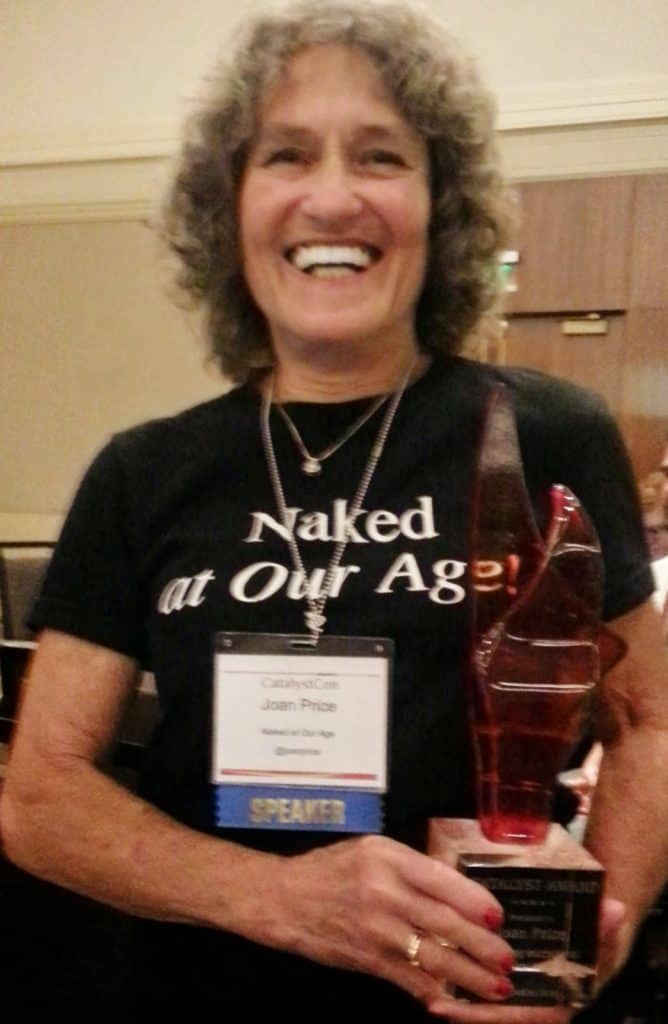 This time, there was an additional surprise for me: I received the Catalyst Award “for inspiring exceptional conversations in sexuality”! I can’t remember what organizer Dee Dennis said about me when I rose to accept the award (I had absolutely no idea in advance!) — all I remember is looking out at 300 people who were standing, applauding, and smiling at me.
This time, there was an additional surprise for me: I received the Catalyst Award “for inspiring exceptional conversations in sexuality”! I can’t remember what organizer Dee Dennis said about me when I rose to accept the award (I had absolutely no idea in advance!) — all I remember is looking out at 300 people who were standing, applauding, and smiling at me.
Here is the description of the purpose and mission of this conference from http://catalystcon.com/:
CatalystCon is a conference created to inspire exceptional conversations about sexuality. It is about reaching out and stimulating those who attend to create those important conversations in their own communities, changing how we as a society talk about and treat sexuality. It is about stimulating the activist that is within all of us and sparking transformation in the way our friends, neighbors, children and even politicians discuss one of the most important aspects of humanity.
This is a conference meant to energize, enlighten and exhilarate. It is a conference where everyone is welcome, everyone is respected, and everyone is encouraged to share their knowledge and experiences. As the struggle continues over issues relating to equal rights, access to health care, and sex education, it is more important than ever to come together and have these important conversations on all areas of sexuality.
The fundamental principle of CatalystCon is that knowledge is power and sharing that knowledge is the first spark in igniting change.
Do you see why winning the 2014 Catalyst Award feels to me like one of the most important honors ever? See why my smile takes over my entire face?
If you can attend in the future, please do. You’ll be changed by it: listening to, learning from, and networking with the most interesting people you’ll ever find in one weekend of sharing information and attitudes about sexuality.
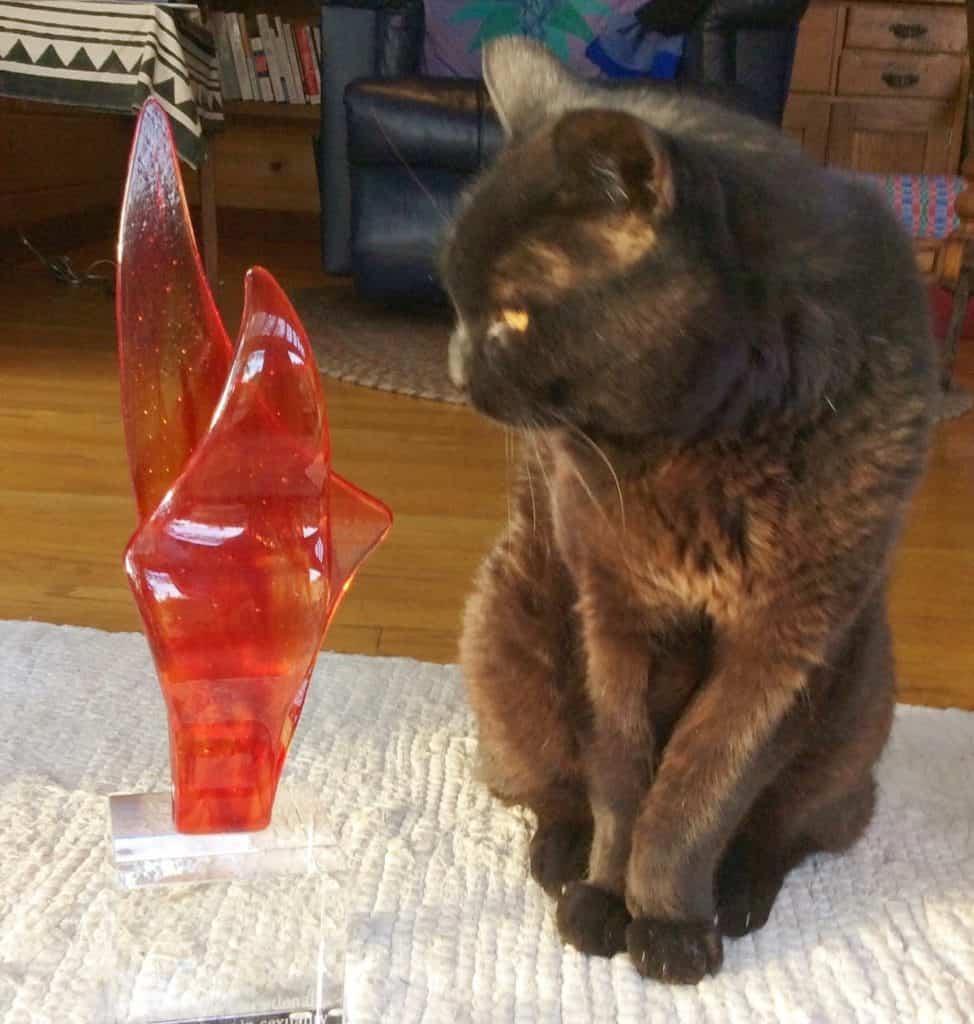 I’ll write more about what I learned from the presenters in another post, coming soon. The conference really wasn’t “all about me,” and neither was my enjoyment of it. I just had to share this much right away!
I’ll write more about what I learned from the presenters in another post, coming soon. The conference really wasn’t “all about me,” and neither was my enjoyment of it. I just had to share this much right away!
Sex after 50 Applies to All Ages: Guest post by Penny
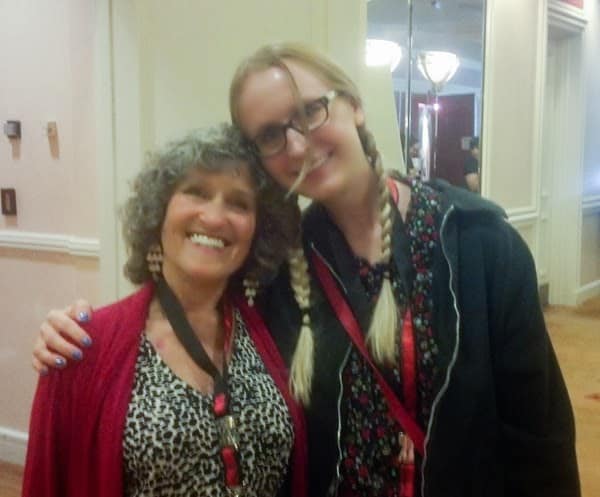 |
| Joan and Penny |
Note from Joan: CatalystCon West 2013 was filled with amazing educators, new information, and a sense of community that I wish we could all feel everyday, everywhere. Normally I would write a synopsis of this conference, sharing what I learned.
But this time, I give the floor to Penny, a remarkable, 26-year-old sex blogger, who attended the session I gave: The 5 Biggest Myths About Sex and Aging. She started this guest post on the plane going home, she told me, tearing up as she wrote it. I’m proud to share it — and her — with you here. With allies like Penny, we’ can indeed change the world.
attitude that I was going to take a leap and learn about something that doesn’t
apply to me, at least not yet. I told Joan this when we ran into each other in
the hall before her panel, and she smiled and said with a chuckle, “Maybe
you’ll find what I have to say useful in about 30 years.”
But I quickly
realized that what Joan was teaching in her panel didn’t only apply to people
aged 50+ — it was relevant to anyone, including myself now, at age 26.
aging was the idea that what felt good to us in the past should still make
us feel good now, and that when it doesn’t, there must be something wrong, and
we might as well just give up.
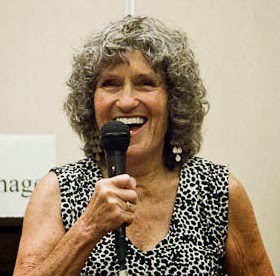 |
| photo by Roman Roze |
She explained that as our bodies change with age
later in life, the ways we experience arousal and pleasure change as well, and
that this is perfectly normal. She went over specifics, like the differing
needs that seniors may require in a toy, such as very strong vibrations, the
ability for the toy to last long enough to endure a longer cycle of arousal,
ergonomically comfortable designs for arthritic hands, easy to use controls,
etc.
people outside of my age demographic, but the underlying message was universal:
We must remember that sexuality is fluid and that it changes. Our
bodies change, our lives change, our needs and wants change. Self-exploration is a continuous process.
I may not be 50 yet, but what turned
me on when I started having sex at age 16 is dramatically different from what
turns me on now. My challenges with arousal are not the same as senior
challenges, but they’re there. Some weeks I feel down and emotional, and I
don’t want to take the time to give myself the self-care that I need. I have moments when I think, why isn’t this working like
it usually does? Why can’t I just orgasm like I usually do?
myself the compassion I would give a friend. If someone came to me and said
something wasn’t working for them, I would encourage them to keep trying
because they deserve pleasure. I would try to help them find new ways to
experience arousal and suggest new toys and techniques. I would also tell them
that there is nothing wrong if something just isn’t working right now, and that
pleasure and orgasms don’t always come easily.
Everyone deserves that encouragement
and support. We must allow ourselves to exist as we are right now, instead of
trying to conform to what society expects of us or even what we expect of ourselves.
because we’ve changed, and we feel like we aren’t ourselves anymore, everything
Joan discussed was not only relevant to seniors, but to
everyone. The importance of communication between partners, adaptation to
change, making time for pleasure and practice, and continual commitment to
self-care, sexual health, and sex education are always important.
about her grief in losing her love and partner. Her words shook me deeply, and
as tears streamed down my cheeks, my sniffles were echoed by a woman sitting
near me. Grief is incredibly personal, and I cannot pretend to know what Joan
has gone through, but in that moment I felt like her grief was somehow also
mine. Grief for her loss, for everyone I’ve lost, and for myself and the deep
fear I don’t usually even realize that I carry with me: that I am alone, that
nothing is certain, and that any day could be my last or my partner’s last.
strength. She said that what lives on after us is what we pass on to others,
what we give to people, what we share, our love and compassion. In that way,
she said, we become immortal. I’m often so wrapped up in my own needs, wants,
concerns, challenges, and privileges that I forget to seek out others’
experiences, to listen as much as I speak, and to share what I have.
her cause, to speak out against ageism, to stop and say, “That’s not funny,” if we hear malicious, ageist “jokes,” and to tell
people that they are beautiful exactly as they are. In return, she offered up
her own voice, to help us in whatever injustices we battle.

Her words echoed
Yosenio V Lewis’s speech from the Opening Keynote, when he called us to take on
someone else’s cause because it is our cause as well, to come together instead
of staying in isolated groups, to collaborate and realize that we are all
ultimately fighting for the same things: love, compassion, and acceptance.
Texas. She explores sexuality creatively through her blog Penny for Your (Dirty) Thoughts,
which is known for its variety of writing, unique sex toy photography, and
erotic self-portraiture.
Marriage Equality and more: LGBT Seniors
 We’re all reading and talking about gay marriage / marriage equality this week. I’d like to invite our LGBT Boomers, seniors, and elders to comment here about their lives growing up without acceptance or equality.
We’re all reading and talking about gay marriage / marriage equality this week. I’d like to invite our LGBT Boomers, seniors, and elders to comment here about their lives growing up without acceptance or equality.
In high school, I had a guy friend who, I learned 50 years later, was gay. How much it would have accelerated my own education and evolution if he had felt he could talk to me about that then. But he didn’t. Maybe he felt he couldn’t. Maybe he thought it was none of my business. Maybe he wasn’t sure. He dated girls at that time.
Fifty years later, when we met again, I asked if he was married. He told me nonchalantly that he was in a decades-long relationship with a man. He said he wasn’t hiding it — he just informed people who asked.
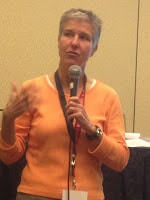 At CatalystCon East this month, I attended Terri Clark’s session, “The Silver Rainbow: Working with LGBT Seniors.” There are more than 1.5 million LGBT older adults in US today, and by 2030,
At CatalystCon East this month, I attended Terri Clark’s session, “The Silver Rainbow: Working with LGBT Seniors.” There are more than 1.5 million LGBT older adults in US today, and by 2030,they’ll number more than 3 million, Terri told us. She is co-chair of The LGBT Elder Initiative
(LGBTEI), which is “committed to assuring that lesbian, gay, bisexual
and transgender older adults have rights and opportunities to live
vibrant, creative and mutually supportive lives.”
you cease to exist.”
I thought I was well-informed, but this session made my jaw drop, especially when Terri showed a short film from Project Visibility (trailer below). In it, people talked about their need to be closeted growing up. “We always kind of lived a lie,” they said. “That was your life and you’re not able to share it. Your story would be missing.”
Even decades later, they lost jobs, family, and their faith community when they came out. One college professor was told, “We don’t have room on the faculty for you any more.”
Many LGBT seniors are still closeted today. This makes them afraid to access senior health and legal services that the rest of us take for granted.
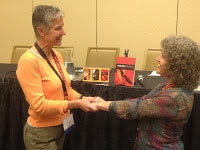 Yes, marriage equality is important. But that’s not the only chapter in this story. Gay or straight, young or old, religious or not, activist or not, we need to come together, stand up tall, and speak out loud for equality for all of us, in all aspects of our lives.
Yes, marriage equality is important. But that’s not the only chapter in this story. Gay or straight, young or old, religious or not, activist or not, we need to come together, stand up tall, and speak out loud for equality for all of us, in all aspects of our lives.
In the words of one of the interviewees, “It’s who we are. It’s not a moral issue.”
CatalystCon: celebrating sexuality
I’m basking in the joy of CatalystCon, a weekend of learning and sharing with other sex educators and self-proclaimed sex geeks. The mission of this event was “Sparking Communication in sexuality, activism and acceptance.” Oh yes, mission accomplished.
Though most attendees were younger and I was the only speaker on senior sex, there were other people with grey hair (or they would have had grey hair had they not colored theirs). I felt total acceptance from all the people I met, even those decades younger. The sex-positive nature of the event conveyed this message to everyone: “I celebrate my own sexuality, sexuality in general, and your sexuality, no matter how different from mine yours might appear to be.”
| Megan Andelloux |
I tried to choose from 40 sessions presented over two days, wishing I could attend them all. For every session I attended, there were four I had to miss.
| Charlie Glickman |
Some of my favorite sex educators featured in Naked at Our Age were speaking: Carol Queen, Charlie Glickman, Megan Andelloux. There were names that inspire recognition and awe, such as Dr. Marty Klein.
(Want your own “Sex Geek” shirt? Order from Reid Mihalko here.)
I attended sessions where I’d learn information that you, dear sex-positive senior readers, would benefit from knowing, and others where I’d come away with plenty of “huh! I didn’t know that!”
For example, the “Toxic Toys” session with Metis Black, founder of Tantus, high quality silicone sex toys; Jennifer
Pritchett, founder of Smitten Kitten; and feisty educator and author, Ducky Doolittle. I was amazed by their stories of activism in an industry where sex toys used to be cheap, easily broken, and made of noxious materials that leached chemicals into our mucous membranes. We have women like these three activists to thank for the safety and quality of sex toys today.
 One of the most memorable speakers I heard was Buck Angel. Buck calls himself “a man with a vagina” — he’s a transgender man who elected to have top surgery but not bottom surgery.
One of the most memorable speakers I heard was Buck Angel. Buck calls himself “a man with a vagina” — he’s a transgender man who elected to have top surgery but not bottom surgery.
As a child named Susan (but everyone called him Buck), he was a “total tomboy” and thought of himself as a boy. “Occasionally someone would say, ‘You’re a girl,” and I’d beat the crap out of them, and they’d say, ‘OK, you’re a dude,’” he says. “Everything was fine until at 15, puberty hit. Not puberty as a boy – but puberty as a girl. Here I am bleeding, my boobs are growing, I’m turning into a woman.”
He had his sex change 20 years ago, before female-to-male changes were done. He was the “guinea pig” for the surgeon who removed his breasts. “For years I hated what I was, and now I love it,” he says.
Now Buck is 50 years old, a porn star (“the man with a pussy”), transgender activist, and motivational speaker. His past includes alcohol and drug addiction, modeling, hustling, attempted suicide, and death threats. “I should be dead,” he says. “Why am I still here? Because I have a message to give the world: Deprogram yourself, and love your vagina.” Buck Angel’s story is worthy of a book. (Buck, do you need a ghostwriter?)
 |
| Carol Queen & Robert Lawrence |
Another provocative session was “Why Talk about Sex and Disability?“, co-presented by Robin Mandell and Dr. Robert Morgan Lawrence (who also gave a fascinating talk on “The Anatomy of Pleasure” with his partner Carol Queen).
| Robin Mandell |
Robin referred to people without disabilities as “temporarily able-bodied” and made the point that we have much to learn from sex-positive people with disabilities. Robert, who referred to himself as “old and crunchy,” jolted us all when he spread out all the medications he has to take for myriad medical challenges including pain that limits mobility. He has had to make many accommodations sexually as well as in other ways. “It took being crippled to realize that sex wasn’t penetration,” he says.”
I had fun at a workshop learning to use the new version of the female condom, called the FC2. If your experience was with the first female condom, which felt and sounded like having sex with a shower curtain, you’ll be happy to know the material is completely different now. It’s great for folks of our age, because the penis can be inserted even if it’s not erect, and lube in the condom doesn’t dry up or get absorbed.It can also be used for anal sex for either gender, just remove the inner ring. One man in the workshop said it was a way “to feel bareback sensations while staying protected.” (This video shows how to insert it and gives lots of info.)
Okay, the female condom does look funny (especially in this model with a dildo in it that we passed around — should I not have shared this?), but the workshop leaders, Planned Parenthood sex educators Alma de Anda and Mayra Lizzette Yñiguez, advised us to give it three tries to discover how comfortable and empowering it is. They gave me a bunch of samples (three in a pack, to prove their point) to share with my workshop attendees!
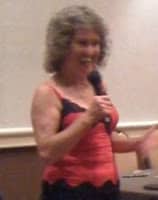
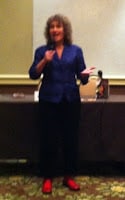 My own session was titled “Senior Sex Out Loud,” the story of my journey from high school English teacher to fitness professional/ health writer to sex educator/ senior sex advocate, with experiences along the way that were sometimes amusing, sometimes amazing, occasionally appalling. I started out wearing a jacket, but shed it when I talked about body acceptance. (Want to hear this speech yourself, or offer one of my workshops at your venue? I have a suitcase packed, would love to come to you. Please email me and let’s talk.)
My own session was titled “Senior Sex Out Loud,” the story of my journey from high school English teacher to fitness professional/ health writer to sex educator/ senior sex advocate, with experiences along the way that were sometimes amusing, sometimes amazing, occasionally appalling. I started out wearing a jacket, but shed it when I talked about body acceptance. (Want to hear this speech yourself, or offer one of my workshops at your venue? I have a suitcase packed, would love to come to you. Please email me and let’s talk.)
But CatalystCon was more than the knowledge, more than the networking, more than the
opportunity for me to share what I do and how I feel about it, more than
learning what other sex educators do and how they feel about it. It
felt like a brave new world was possible, one in which acceptance and
celebration reigned.
Imagine living in a society free of closed-minded people and repressive attitudes and policies, where we celebrate our similarities and our differences and are truly
kind to each other. That was in the air at CatalystCon.
I applaud Dee Dennis, who conceived and birthed CataystCon; the sponsors who made it possible and affordable; the extraordinary speakers who were willing to donate their wisdom and incur their own travel expenses; and the attendees who were eager to absorb new knowledge, communicate openly (even those who wore the “I’m shy” wristbands that Reid gave out), and take our messages home. CatalystConWest will become a yearly event, and CatalystConEast will rock your world March 15-17, 2013 in Washington, DC.
As always, I welcome your comments.
